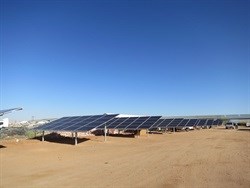
Top stories

Energy & Mining#MiningIndaba: How GenAI is reinventing mine maintenance in South Africa
Maroefah Smith 2 hours



ICTRevolutionary spectrum sharing tech set to transform SA's rural internet access
Paul Colmer 55 minutes


More news










This is the biggest privately owned solar array project in the semi-desert Northern Cape region. It is also one of South Africa's first abattoirs to power its cold storage system with solar electricity.
The system generates approximately 95kWp and includes 405 Sunmodule Plus SW 250 poly solar modules installed in the field outside the abattoir. It is designed to feed directly into the electricity grid, offsetting approximately 60% of the abattoir's own electricity consumption yearly over the 25-35 year lifetime of the system.
"The Kakamas Abattoir is used by most of the livestock farmers in the region and continuous energy supply is needed for slaughter as well as cold storage," says Hendri de Beer, project director of SolarTrends.
Kakamas Abattoir also has a butchery which sells fresh meat products including beef, lamb and pork. Its produce is destined for local and international markets. The Kakamas region, known for its dry and hot climate, has many livestock farmers who depend on the abattoir as a vital business partner in the cold chain.
"The Kakamas region has an abundant supply of sunshine," explains Gregor Küpper, managing director of SolarWorld Africa. "Because of its remote desert-like location, it is a growth node for the solar industry. We are delighted to have partnered SolarTrends on this innovative project which is setting a new standard for sustainable solar energy in the cold chain of livestock farmers. This project builds on SolarWorld Africa's many successful projects in the farming industry across Africa."
In recent years, the growth of the local agricultural and tourism economy has been hampered by power cuts and an innovative energy solution had to be found to preserve the huge quantities of meat in a semi-desert climate.
"A key challenge of the project was to minimise the impact of the free-field installation on the logistical requirements of the abattoir's day-to-day operations. With a road passing through the field for trucks and cars, the placement of the solar panels had to be carefully designed to cater for access, delivery and collection points, areas to turn the trucks around and parking facilities," says De Beer.